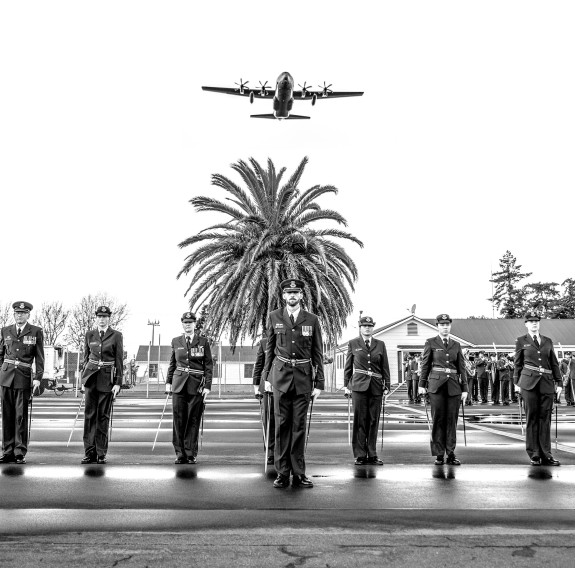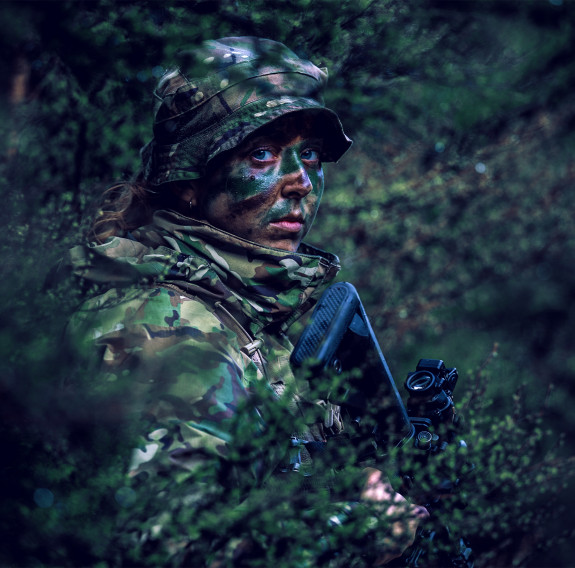WHERE LEADERS TAKE FLIGHT
10 July, 2025
Preparing our future Royal New Zealand Air Force (RNZAF) leaders for the world’s rapidly-moving strategic environment starts with 18 challenging and transformative weeks of Initial Officer Training. It’s more than a course - it’s the foundation of a military career built on leadership, resilience, and operational decision making.
For 80 years,
RNZAF Base Woodbourne can be found west of Blenheim in the upper South Island. A key training and support Base, Woodbourne is where our newest recruits undergo initial military training before officially joining our ranks.
Upon graduation, officer cadets will be able to perform the duties and tasks required of an RNZAF junior officer; including basic military skills, leadership, management, drill and ceremonial functions, written and verbal communication, and global security awareness. The skills learnt and the networks developed over the duration of this course ensure that graduates are ready to confidently step into the RNZAF as the next generation of leaders.
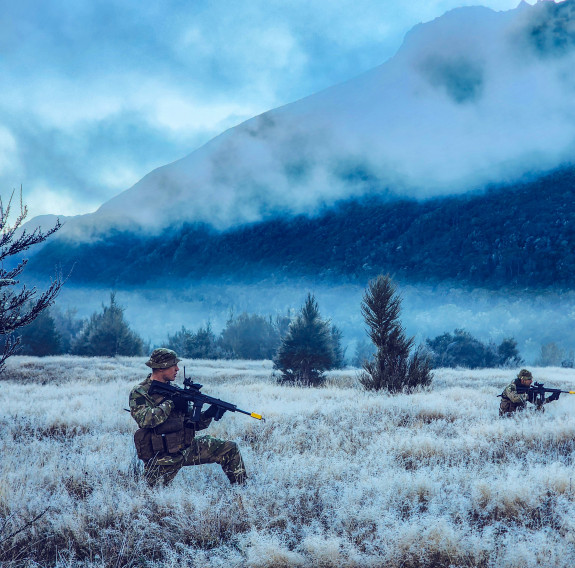
Officer Cadets of the 25/01 Initial Officer Training course during an exercise.
Eighteen weeks, six key capabilities
Our future officers focus on six key capabilities in the 18 weeks they are at RNZAF Base Woodbourne. Each capability is developed through a carefully balanced mix of practical, academic and field-based learning which set them up for success in leading high-performing teams across the RNZAF and wider New Zealand Defence Force (NZDF).
1. Military professionalism – Operational
Learning to operate personal weapon capability, navigation skills, first aid, field craft skills, operating in a tactical field environment, operational readiness.
2. Military professionalism – Non-operational
Military briefs, dress and grooming standards, barrack living standards, foot drill, junior officer ceremonial duties.
3. Organisational awareness
History of the RNZAF, organisational characteristics, taonga of the RNZAF, geo-strategic awareness, culture and traditions.
4. Command, leadership, management
Command principles, leading a team, managing personnel, leadership knowledge and skills.
5. Personal communication
Written and verbal communication.
6. Workplace safety
Managing aspects of workplace safety.
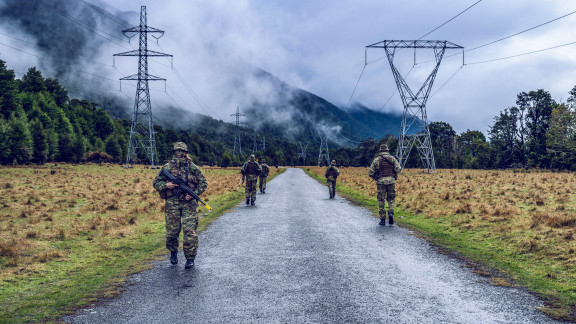
Officer Cadets during Exercise Revelation
Lead self, lead teams
The content of Initial Officer Training has evolved over recent years to ensure students arrive on the workface with an operational mindset and confidence in decision making. This allows graduates to focus on strategic intent and adjust their own tactical and operational approaches within their own workplaces to ensure alignment. The course is split into two phases that aim to target ‘Lead Self’ and ‘Lead Teams’ skills.
‘Lead Self’ focuses on self-management, and showing initiative and judgment based on NZDF values. ‘Lead Teams’ shifts students into a managerial and leadership mindset that prepares students to hold others to account on tasks, behaviours and values. This phase includes four practical leadership exercises designed to coach and then assess competence within an operational military context.
My biggest takeaway was if you have a plan to stick to it, and don’t let the loud voices in the room sway you.
Flying Officer Celine Conaglen
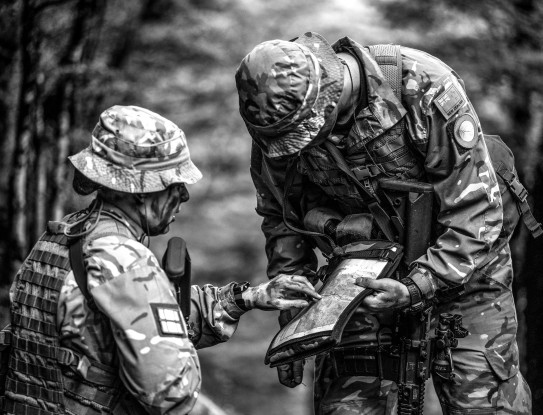
Crawl, walk, run
Initial Officer Training Course Director Flight Lieutenant Kevin Shanley said this training is vital because junior RNZAF officers must be ready to lead in a wide range of scenarios.
“We use a progressive ‘crawl-walk-run’ method in our development approach to leadership training.”
In the ‘Lead Self’ phase of training, students take part in Exercise Long Wait at Dip Flat training area in the Upper Wairau Valley in Marlborough. This is the ‘crawl’ phase where basic to mid-level military skills are taught, giving students’ exposure to a field deployment for the first time.
Following this, Exercises Aurora and Aedificare continue to develop upon these skills before being tested in a final summative phase of the course, in a ‘pass or fail’ leadership task, in the field. Exercise Revelation is the ‘run’ phase of professional development, where officer cadets are tested on their ability to apply functional leadership principles which are critical to being an officer in the RNZAF.
Flight Lieutenant Shanley said CRTS aims to produce an RNZAF officer with a military mindset who can operate within a variety of military roles or situations.
“Once they are able to do this and graduate, they will undertake their training within their trade specialisations around the country.
“The aim of Exercise Revelation is to gain experience within the deployed environment, and to plan, organise and run a Forward Operating Base (FOB),” he said.
Flying Officer Celine Conaglen said while she enjoyed the variety of scenarios throughout the final exercise, there was always the unpredictability of what they could encounter.
"The most challenging thing was your team was always changing. This was an essential skill to develop and be able to identify and utilise the strengths of your team in order to execute a mission effectively."
She said the highlight of the exercise was being able to put the leadership techniques they have been developing into action.
“Personally, seeing my own growth as a leader come to fruition was rewarding. Throughout the exercise I would find myself constantly reflecting on my own contribution to the team and my own performance.
“My biggest takeaway was if you have a plan to stick to it, and don’t let the loud voices in the room sway you,” Flying Officer Conaglen said.
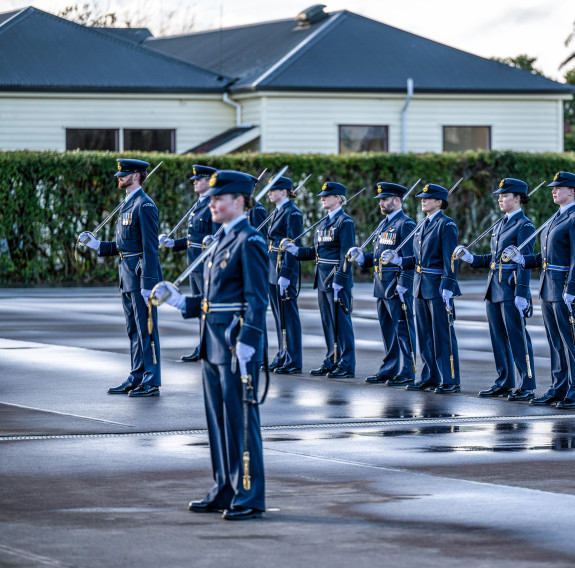
Officer Cadets of the 25/01 Initial Officer Training course graduation
Graduation
Graduation marks the culmination of months of hard work. In the lead up to graduation, our soon-to-be RNZAF officers have a formal dinner, change of rank ceremony, development goal setting and parade rehearsals in preparation for stepping onto the CRTS parade ground in Woodbourne.
Former Warrant Officer of the Air Force and now officer, Flight Lieutenant Kerry Williams said that he enjoyed being back in the field and putting to use his core military skills.
“The highlight for me has been being back within teams and doing my best for the success of others.
"Seeing the development of the direct-entry officers over the course has been amazing with some of them handling weapons for the first time and learning about military processes and all of our operational jargon."
In his final leadership exercise of the course, he said his major takeaway was being comfortable to let new learning occur and to ‘fail safe’ if faced with difficulties.
“The ability to empower though delegation and responsibilities as a leader was great, but just as satisfying has been the ability to work hard for someone else and see how your positive attitude can impact others and contribute to mission success.”
He said trying not to solve everything yourself and consequently taking away learning opportunities for others, was something he had been conscious of.
“I have really enjoyed getting back into the tactical application of leadership as an individual and in a team.”
Officer cadets of the 25/01 Initial Officer Training course graduate during their march out parade at RNZAF Base Woodbourne.
Flying Officer Stella Urlich said the IOT course confronted her with a number of challenges along the way and although hard, it was great to be pushed outside her comfort zone.
“I found the field exercises particularly mentally and physically challenging. They were designed to expose us to uncertain and challenging environments and to teach and test our leadership skills.
“As a result, I have ended up doing things that a year ago I would never have thought myself capable of doing.
“I have really appreciated the opportunity to develop my resilience, discipline and leadership skills. I am looking forward to bringing my experiences from the course with me into my role as a Learning and Development Officer,” Flying Officer Urlich said.
She said she has appreciated being on course with people who have supported and encouraged each other.
“We have fostered a great sense of camaraderie and I am looking forward to seeing everyone succeed in their various positions as we go forward from graduation.
“I am aspiring to make meaningful contributions to enhancing learning systems in order to meet the evolving needs of the organisation,” she said.
The Air Force starts here. Are you ready to lead from the front?
Join a team you can count on defencecareers.mil.nz(external link)
